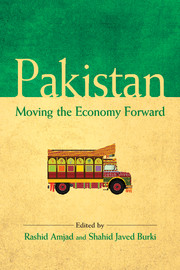Book contents
- Frontmatter
- Contents
- List of figures and tables
- Preface
- 1 Overview
- 2 Failed Economic Promise: Lessons from Pakistan's Development Experience
- 3 Economic Management Under IMF Tutelage: Key Lessons from the Musharraf and PPP Rule 1999–2013
- 4 A Country and an Economy in Transition
- 5 Tackling the Energy Crisis
- 6 Exports: Lessons from the Past and the Way Forward
- 7 The Future Path of Tax Reforms in Pakistan
- 8 Pakistan's Indus Basin Water Strategy: Past, Present and Future
- 9 Economic Governance and Institutional Reforms
- 10 Benefiting from Foreign Direct Investment
- 11 An Analysis of the Remittances Market in Pakistan
- 12 The Prospects for Indo-Pakistan Trade
- 13 Beyond the Poverty Line: A Multidimensional Analysis of Poverty in Pakistan
- 14 Can the New Intergovernmental Structure Work in Pakistan? Learning from China
- Contributors
- Index
Preface
Published online by Cambridge University Press: 05 May 2015
- Frontmatter
- Contents
- List of figures and tables
- Preface
- 1 Overview
- 2 Failed Economic Promise: Lessons from Pakistan's Development Experience
- 3 Economic Management Under IMF Tutelage: Key Lessons from the Musharraf and PPP Rule 1999–2013
- 4 A Country and an Economy in Transition
- 5 Tackling the Energy Crisis
- 6 Exports: Lessons from the Past and the Way Forward
- 7 The Future Path of Tax Reforms in Pakistan
- 8 Pakistan's Indus Basin Water Strategy: Past, Present and Future
- 9 Economic Governance and Institutional Reforms
- 10 Benefiting from Foreign Direct Investment
- 11 An Analysis of the Remittances Market in Pakistan
- 12 The Prospects for Indo-Pakistan Trade
- 13 Beyond the Poverty Line: A Multidimensional Analysis of Poverty in Pakistan
- 14 Can the New Intergovernmental Structure Work in Pakistan? Learning from China
- Contributors
- Index
Summary
Today, well into the seventh decade of its existence as an independent state, Pakistan is passing through a critical period. It is navigating a perfect storm and faces not one but several daunting challenges. Extremist forces continue to challenge the state and the Constitution. The economy remains under stress and depends on large external flows to remain solvent. The rate of population growth remains relatively high; every year, the country adds close to four million people to its large population. Its human resources are poorly developed. There are severe power shortages; apportioning the limited supply of power means plunging large areas into complete darkness several times a day and for several hours at a time.
While fully aware of the depth and spread of such problems, we were equally convinced that there were enough “positives” in Pakistan's economic and social systems to think in terms of a better future for the country. It is difficult to practice development economics without a tinge of optimism. Pakistan is richly endowed with resources that could be deployed to produce a higher rate of growth. It has the world's largest contiguous irrigated area, for instance, and if it were to move toward the production of higher value-added crops, agriculture could become an even more significant part of the economy. The country has rich, if largely unexplored, mineral resources and traditional engineering skills that could be developed into supply chains to feed some of the large industrial production systems in the neighborhood. There is also Pakistan's proximity to Asia's two mega-economies, China and India—not only could it develop strong and beneficial economic relations with these two economic powerhouses, but it could also provide land routes for commerce, linking China and India with energy-rich Central Asia and the Middle East.
Supportive public policies are required to make these and other “positives” work for the country.
- Type
- Chapter
- Information
- PakistanMoving the Economy Forward, pp. xi - xivPublisher: Cambridge University PressPrint publication year: 2015
- 1
- Cited by



